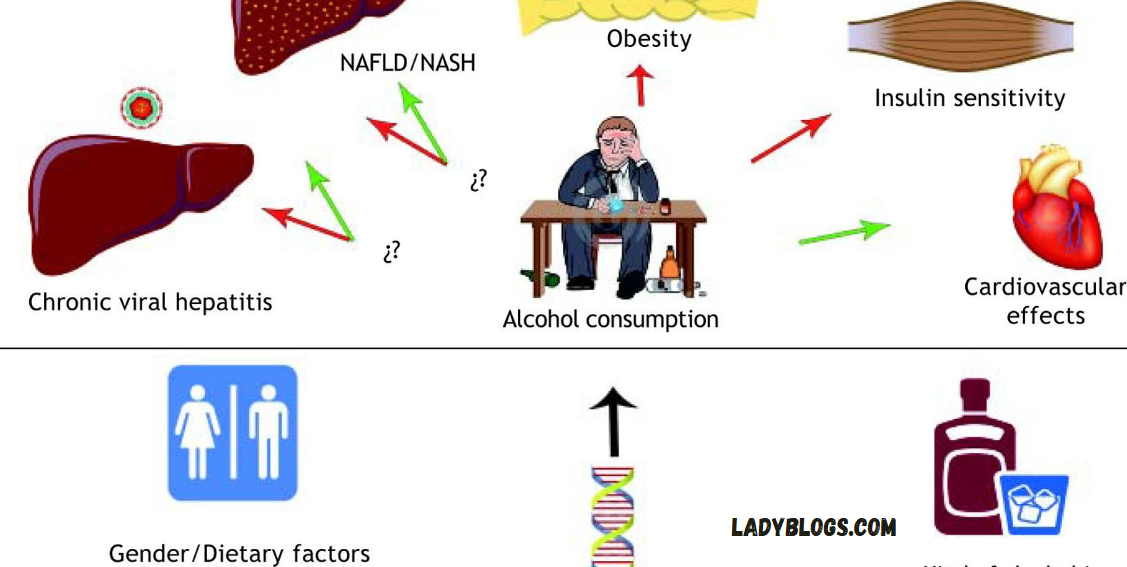A recent federal report from a Department of Health and Human Services group has raised concerns about the potential health risks of alcohol consumption. The January 14 report highlights that consuming just one alcoholic drink per day may increase the risk of serious health issues, including liver cirrhosis and several forms of cancer.
These findings come in the wake of new guidelines issued by U.S. Surgeon General Vivek Murthy, MD, which suggest that even moderate alcohol consumption could elevate the risk for at least seven types of cancer. Dr. Murthy also proposed that alcoholic beverages, including beer and wine, carry warning labels to inform consumers about these potential cancer risks. However, implementing this change would require approval from Congress.
The findings have prompted many to question how much alcohol can be consumed without significant health consequences.
Experts generally agree that, in principle, the lower the level of alcohol consumption, the lower the risk of negative health effects. However, what constitutes “safe” drinking can vary depending on a variety of factors, including a person’s age, health status, genetic predispositions, and lifestyle.
Here’s an overview of what you need to know about safe alcohol consumption.
Is Moderate Drinking Safe?
The Centers for Disease Control and Prevention (CDC) currently recommends that men consume no more than two alcoholic drinks per day and women no more than one, which aligns with guidelines for moderate drinking. However, some experts are questioning whether these recommendations are becoming outdated.
Dr. Aashish Didwania, a primary care physician and medical educator at Northwestern University, expressed to NPR that the standard for moderate drinking should be reassessed. This sentiment is further supported by an August 2024 study which found that even moderate alcohol consumption increases the risk of cancer.
In contrast, a recent report from the National Academies of Sciences, Engineering, and Medicine suggests that moderate alcohol intake could lower the risk of death from heart disease and other causes. However, the same report also linked moderate drinking to a higher risk of breast cancer.
Kristen Kirkpatrick, a registered dietitian at the Cleveland Clinic and president of KAK Consulting, pointed out that consuming one drink per day translates to seven drinks per week, which could increase the risks of heart disease, brain shrinkage, and high blood pressure. She also noted that regular alcohol consumption may contribute to weight gain, which in turn heightens the risks of obesity, cancer, and cardiovascular disease.
Kirkpatrick further emphasized that the definition of “one drink” can vary. The standard serving sizes are 5 ounces of wine, 12 ounces of beer, or 1.5 ounces of spirits, but many people pour more than these amounts. This discrepancy means that what is considered “one drink” for some could actually be closer to one and a half or two, thereby increasing potential health risks.
Dr. Wael Harb, a hematologist and oncologist at MemorialCare Cancer Institute, also warned that daily alcohol consumption—even in small quantities—can carry significant health risks.
Dr. Wael Harb, a hematologist and oncologist at MemorialCare Cancer Institute, warned that even moderate alcohol consumption, such as one drink per day, can carry significant health risks. “Even one drink per day can increase the risk of certain cancers, including breast, esophageal, and colorectal cancers,” he explained to Healthline. “Alcohol also has a small but measurable impact on liver health and brain function over time. For individuals with pre-existing health conditions, even moderate drinking may exacerbate risks such as elevated blood pressure or disrupted sleep patterns. Recent research suggests that no level of alcohol consumption is entirely risk-free.”
Dr. Cheng-Han Chen, a cardiologist and medical director of the Structural Heart Program at MemorialCare Saddleback Medical Center, echoed this concern, highlighting the adverse effects of daily alcohol intake. “Large-scale studies have shown that even one drink per day is associated with an increased risk of various cancers, cardiovascular disease, and an overall higher risk of premature death,” he told Healthline.
Stanford University psychiatrist Dr. Keith Humphreys also agreed, emphasizing that even modest alcohol consumption can raise the risk of certain cancers, particularly for women. “One drink per day can significantly elevate the risk of specific types of cancer, especially among females,” he said.
Is A Few Drinks Per Week Ok?
Experts generally agree that consuming alcohol just two or three times a week is preferable to daily drinking. However, even this level of consumption can still pose health risks for some individuals.
Dr. Wael Harb emphasized that while having one or two drinks per week carries a lower risk compared to daily drinking, it may still contribute to cumulative harm over time, including a slight increase in cancer risk. This risk is especially relevant for individuals with genetic predispositions or other underlying health factors.
Dr. Cheng-Han Chen advised that the safest approach is to drink as little as possible. “We consider fewer than two drinks per week to be in the lowest risk category, aside from complete abstinence,” he noted.
Dr. Keith Humphreys added that consuming a couple of drinks per week likely carries “very little risk,” but even this moderate consumption should be approached with caution.
Health Effects Of Binge Drinking
Binge drinking, typically defined as consuming four or more drinks within two hours for women and five or more for men, can have serious and long-lasting health consequences. The effects of binge drinking vary depending on the frequency and intensity of the behavior, but even occasional episodes can significantly impact health. Here are some of the key health risks associated with binge drinking:
1. Increased Risk of Accidents and Injuries
Binge drinking impairs judgment, coordination, and reaction times, increasing the likelihood of accidents, including falls, car crashes, and drowning. Alcohol poisoning is another severe risk, as excessive drinking in a short period can overwhelm the body’s ability to metabolize alcohol, leading to potentially fatal consequences.
2. Liver Damage
Chronic binge drinking can cause significant damage to the liver, including fatty liver disease, alcoholic hepatitis, cirrhosis, and liver cancer. These conditions result from the liver’s inability to process alcohol efficiently, leading to inflammation and scarring over time.
May You Also like it:
5 Ways to Use Psychology to Develop New Habits
What Beauty Editors Are Buying At Nordstrom
3. Cardiovascular Problems
Binge drinking can elevate blood pressure and increase the risk of arrhythmias (irregular heartbeats), heart disease, and stroke. While moderate drinking may have some protective effects on heart health, binge drinking places considerable strain on the cardiovascular system, raising the likelihood of long-term damage.
4. Mental Health Impacts
Frequent binge drinking is linked to mental health disorders, such as depression, anxiety, and mood swings. Alcohol can interfere with the brain’s neurotransmitter systems, leading to changes in behavior and cognition. Additionally, the cycle of binge drinking and subsequent hangovers can exacerbate feelings of anxiety and depression.
5. Cancer Risk
Binge drinking increases the risk of several types of cancer, including those of the liver, breast, esophagus, mouth, and throat. Alcohol is a known carcinogen, and binge drinking intensifies the exposure to harmful substances that contribute to the development of cancerous cells.
6. Gastrointestinal Issues
Heavy drinking can irritate the stomach lining, leading to gastritis, ulcers, and pancreatitis. Chronic binge drinking also disrupts the gut microbiome, which can impair digestion and nutrient absorption, leading to malnutrition.
7. Weakened Immune System
Alcohol weakens the immune system, making the body more susceptible to infections. Binge drinking can compromise the body’s ability to fight off illnesses and heal from injuries.
8. Addiction and Alcohol Use Disorder
Binge drinking increases the risk of developing alcohol use disorder (AUD). Over time, individuals who binge drink regularly may develop a tolerance to alcohol, requiring more significant amounts to achieve the same effects, which can lead to dependence and addiction.
9. Cognitive Impairment
Repeated binge drinking can have long-term effects on the brain, leading to memory problems, learning difficulties, and impaired decision-making. Chronic binge drinkers may experience reduced cognitive abilities, which can impact both their personal and professional lives.
How much alcohol should you drink?
The amount of alcohol considered safe for consumption varies based on individual factors such as age, health, and lifestyle. However, general guidelines can help inform responsible drinking habits.
1. Moderate Drinking Guidelines
According to the Centers for Disease Control and Prevention (CDC) and other health authorities, moderate drinking is defined as:
- For men: Up to two drinks per day.
- For women: Up to one drink per day.
These limits are based on the fact that men and women metabolize alcohol differently. Women tend to have a higher body fat percentage and lower levels of alcohol dehydrogenase (an enzyme that breaks down alcohol), which means they are more affected by the same amount of alcohol.
2. What is Considered “One Drink”?
It’s important to understand what constitutes a “drink” under these guidelines:
- Beer: 12 ounces (355 ml) of regular beer (approximately 5% alcohol by volume).
- Wine: 5 ounces (150 ml) of wine (approximately 12% alcohol by volume).
- Spirits: 1.5 ounces (44 ml) of distilled spirits or liquor (such as vodka, whiskey, rum, etc.) at 40% alcohol by volume.
3. Low-Risk Drinking
If you want to minimize health risks, lower consumption is recommended. For example:
- No more than one drink per day for both men and women, especially if you have health concerns or a family history of certain diseases.
- Less frequent drinking is often safer, and many experts suggest keeping alcohol consumption to a few days a week rather than daily.
4. Special Considerations
- Health Conditions: People with liver disease, certain cancers, or a history of alcohol use disorder should avoid drinking alcohol altogether.
- Medications: Alcohol can interact negatively with many medications, so it’s essential to consult with a healthcare provider about alcohol consumption if you are on prescription or over-the-counter drugs.
- Pregnancy: There is no known safe amount of alcohol during pregnancy. It’s best to abstain entirely if you are pregnant or planning to become pregnant.
5. What to Avoid
- Binge Drinking: Consuming large amounts of alcohol in a short period (five or more drinks for men, four or more for women in about two hours) can significantly increase the risk of accidents, liver damage, heart disease, and several types of cancer.
- Heavy Drinking: Regularly exceeding the moderate drinking limits can lead to alcohol use disorder, liver disease, cardiovascular problems, and other severe health conditions.
Frequently Asked Questions
Is moderate alcohol consumption really safe?
Moderate alcohol consumption may pose less risk than heavy drinking, but it’s not entirely risk-free. While some studies suggest that moderate drinking (up to one drink per day for women and two for men) may have heart health benefits, alcohol can still increase the risk of certain cancers, liver disease, and other health issues. The safest choice is no alcohol, particularly for those with certain medical conditions or risk factors.
Can alcohol increase the risk of cancer even in moderate amounts?
Yes, even moderate alcohol consumption is linked to an increased risk of certain cancers, including breast, liver, esophageal, and colorectal cancers. The more you drink over time, the greater the risk. The U.S. Surgeon General and other health organizations have highlighted these concerns and recommend minimizing alcohol intake.
What are the health risks of drinking more than moderate amounts?
Excessive alcohol consumption—whether it’s regular heavy drinking or binge drinking—significantly increases the risk of liver disease, high blood pressure, heart problems, brain damage, and several types of cancer. It can also lead to addiction and mental health issues like depression and anxiety.
Does moderate drinking have any health benefits?
Some studies suggest that moderate alcohol consumption, especially red wine, may have benefits for heart health, particularly in older adults. However, these potential benefits should be weighed against the known risks, such as an increased risk of cancer and liver damage. The benefits of alcohol are often overstated and may not apply to everyone.
Can drinking alcohol lead to weight gain?
Yes, alcohol contains “empty” calories—meaning it provides energy without significant nutritional value. Regular alcohol consumption can contribute to weight gain, particularly if it leads to overeating or if combined with unhealthy eating habits. Additionally, alcohol can disrupt metabolism and hormone levels, further contributing to weight management challenges.
Is it better to drink daily or only on weekends?
Health experts recommend limiting alcohol consumption to occasional drinking rather than daily consumption. Even moderate daily drinking increases the risk of health issues over time, such as liver disease, high blood pressure, and cognitive decline. It’s generally better to space out drinking days and limit total alcohol intake.
Can I safely drink alcohol if I have a medical condition?
People with certain medical conditions, such as liver disease, cardiovascular problems, or a history of alcohol use disorder, should avoid alcohol altogether. Even moderate drinking can exacerbate these conditions. Always consult with your healthcare provider before consuming alcohol if you have any underlying health issues or are taking medication that may interact with alcohol.
Conclusion
While moderate alcohol consumption—defined as up to one drink per day for women and two for men—may be relatively low-risk for some individuals, it is not without its potential health consequences. Even moderate drinking has been linked to an increased risk of several health issues, including certain cancers, liver disease, cardiovascular problems, and mental health concerns. The dangers of alcohol consumption can vary based on individual factors such as age, genetic predispositions, medical history, and lifestyle.
While some studies suggest potential benefits of moderate alcohol intake, particularly for heart health, these benefits should be weighed carefully against the well-established risks, including the risk of developing alcohol use disorders or exacerbating existing health conditions. For those looking to minimize health risks, reducing alcohol intake or choosing to abstain entirely may be the safest option.





